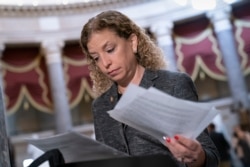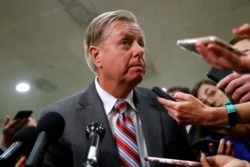The top U.S. diplomat in Ukraine told House officials Tuesday that he was told the White House would only free military aid to Ukraine if it publicly promised to investigate Democrats and the Bidens.
Acting U.S. Ambassador William Taylor's closed-door testimony in the Trump impeachment inquiry directly contradicts the president's assertion that there was no "quid pro quo" with Ukraine.
Taylor repeated his belief that it was "crazy" to make badly needed military aid to Ukraine contingent on Kyiv's promise to investigate alleged corruption by presidential candidate Joe Biden and the Democratic Party.
Taylor said in his opening statement that he had a telephone conversation with U.S. Ambassador to the EU and Trump campaign donor Gordon Sondland, who testified last week.
"During that phone call, Ambassador Sondland told me that President Trump had told him that he wants (Ukrainian) President Volodymyr Zelenskiy to state publicly that Ukraine will investigate Burisma and alleged Ukrainian interference in the 2016 election."
Former U.S. Vice President Joe Biden's son, Hunter, sat on the board of Burisma, a Ukrainian gas company. Trump alleges that when Biden was vice president, he threatened to hold up loan guarantees to Ukraine unless it stopped an earlier corruption probe of Burisma.
But there has never been any evidence of corruption by the Bidens. Allegations that Ukraine interfered in the 2016 presidential election on behalf of Democrats was based on a debunked conspiracy theory.
Taylor said Sondland told him Trump wanted Zelenskiy "in a public box by making a public statement about ordering such investigations."
According to Taylor, Sondland admitted he made a "mistake" when he told Ukrainian officials that only a White House meeting with Trump depended on Zelenskiy publicly promising investigations.
"In fact, Ambassador Sondland said 'everything' was dependent on such an announcement, including security assistance," Taylor added.
Sondland had earlier said when he told other diplomats Trump insisted there would be no "quid pro quo" with Ukraine, he was actually repeating what Trump told him what to say in a telephone call.
Trump was apparently seeking Ukraine's help in digging up dirt on Biden, his potential rival for the presidency in 2020.
Democratic-led House committees are holding closed-door hearings to decide whether to recommend Trump's impeachment in part for allegedly reaching out to a foreign government to interfere in a U.S. election.
Florida Democrat Debbie Wasserman Schultz called Taylor's testimony "The most damning testimony I've heard."
But White House spokeswoman Stephanie Grisham again denied there was a quid pro quo.
"Today was just more triple hearsay and selective leaks from the Democrats' politically motivated closed-door secretive hearings. Every day this nonsense continues, more taxpayer time and money is wasted," she said in a statement late Tuesday.
Trump came under strong criticism Tuesday when he called the impeachment inquiry a "lynching," referring to a murderous practice white supremacists used to intimidate freedom-seeking African Americans after the Civil War, and as recently as 1981.
"Are you comparing a constitutional process to the PREVALENT and SYSTEMATIC brutal torture of people in THIS COUNTRY that looked like me?" Congressional Black Caucus chairwoman Karen Bass responded on Twitter.
Republican House Minority Leader Kevin McCarthy was more subdued in his criticism, saying, "That's not the language I would use. I don't agree with that language, pretty simple."
Biden said, "Our country has a dark, shameful, history with lynching, and to even think about making this comparison is abhorrent. It's despicable."
Ex-Congressman Beto O'Rourke, who also is seeking the Democratic nomination, said, "The legacy of slavery, segregation, Jim Crow, and suppression is alive and well in every part of this country, including the White House where the president is a white supremacist."
Former Republican National Committee chairman Michael Steele, who is African American, declared, "Trump, this is not happening to you and it's pathetic that you act like you are such a victim."
But Republican senator and Trump stalwart Lindsay Graham was untroubled by the president's inflammatory words, calling them "pretty well accurate. ...This is a joke. This is a sham. And this is a political lynching."
White House spokesman Hogan Gidley defended Trump, maintaining he is "not comparing what happened to him with one of our darkest moments in American history. He's just not."








